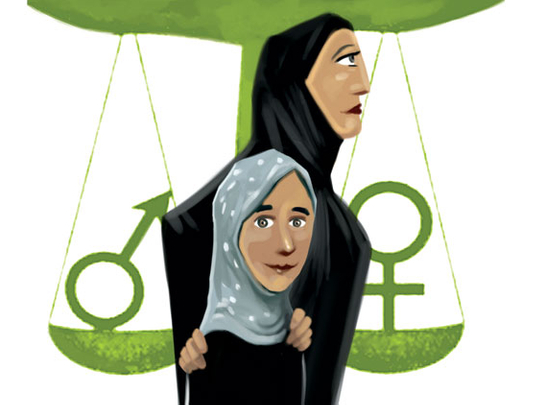
On the occasion of the UAE’s 40th National Day in December of last year President His Highness Shaikh Khalifa Bin Zayed Al Nahyan issued a decree allowing Emirati mothers to pass citizenship onto their children once they reached 18 years of age. Given both the xenophobic and patriarchal attitudes that prevail in the GCC, this was both bold and unexpected. This, especially since the UAE embarked on an ambitious national identity branding project over the past decade that heightens the distinction between being a UAE national and being the “other”. As well as reviving pastimes like falconry, poetry and desert-oriented sports, this project for reasserting an “Emirati” identity included a programme for “strengthening Emirati families”. In 2010 a charter released by the Cabinet stated that marriage among UAE citizens should be a vital component of the heritage preservation project. A marriage fund set up in 1992 with that very principle in mind rewards UAE nationals for such marriages with Dh70,000 given to the husband at the time of the first marriage. (Similarly, in Kuwait, you are rewarded for your first marriage to a national by a lump sum of 2,000 Kuwaiti dinars [Dh26,115] each. The idea of preserving the purity of the Emirati race is symptomatic of the tribal mentality that dominates the GCC. It also stems from a reluctance to further burden state coffers with the subsidised lifestyle demands of GCC nationals. In the conservative UAE, it’s an understandable reaction to the sudden influx of millions of foreigners living and working on its soil; while the governmental promotion of inter-Emirati marriages is a manifestation of the bicultural anxiety that underpins a wider GCC struggle to retain traditions and a sense of self in the midst of the relentless and irresistible tide of modernity and progress.
As the UAE embraces the next step in its 40-year evolution as an integrated federal union, it needs to promote gender equality as a basis for involving the greatest number of citizens in the political and economic process. Allowing Emirati women to pass citizenship onto their children is a realistic and humanitarian step because of the undeniable fact that opening up to foreigners inevitably leads to intermarriage with them, regardless of gender. If men are not being denied passing citizenship to their children or their spouses, women should not be penalised for making the same choice, as delineated by conventions the UAE has signed on to such as the Convention on the Elimination of All Forms of Discrimination against Women (CEDAW) and the International Covenant of Human Rights. The suffering of national women married to non-nationals has been highlighted by many NGOs across the GCC and the Arab Middle East. This is an especially acute problem in Lebanon and Jordan. The “My Nationality is a Right for Me and My Children” campaign initiated in Bahrain in 2006 has since been adopted by family-oriented groups in Kuwait, Saudi Arabia and Qatar. By law, women in the GCC, even those married to Arab Muslims, can only pass on nationality in cases of divorce or widowhood, and even then it’s a difficult and uneven process. Through amending this citizenship flaw, the UAE has once again become a GCC leader, putting pressure on neighbouring states with a much greater number of national women married to foreigners such as Kuwait and Saudi Arabia. Giving women the chance to preserve their heritage while passing citizenship to their offspring should not be a gift — it’s a constitutional right and facilitates loyalty, devotion and filial respect. Mothers are the cultural compass of any nation, passing on belief systems and values as primary caretakers to young men and women who will provide a much needed home grown labour force for the UAE’s growing economy. Dignity is retained within family units when women no longer have to worry about how they and their children will suffer with residency issues, lack of educational facilities, healthcare, work opportunities and home ownership.
The events of 2011 have shown that Arab countries need to protect themselves, their citizens and their residents from the sense of alienation that comes with prolonged exposure to social injustice, and the GCC states are no exception. This decree has breathed new hope into other citizenship dilemmas like statelessness and naturalisation that are difficult to resolve in the UAE and elsewhere in the Gulf. Out of 5,000 eligible cases, 900 of those born to Emirati mothers have now been green-lighted for citizenship, and that is truly something to celebrate. Hopefully, this citizenship law will be amended so that children of Emirati women would no longer wait until they are 18 to become citizens. And, like those born to Emirati fathers, can become so at birth. In a sense, this decree has solved one issue by creating another, forcing these would-be citizens to give up a nationality retained for 18 years to gain the UAE one. By law UAE citizens cannot hold dual nationality, so this waiting period makes the negation of paternal nationality even more demoralising. It’s a muddled blessing for future generations, who are yet to be born, and have to face this state of citizenship limbo for 18 years.
Alanoud Al Sharekh is a senior fellow for regional politics at the International Institute for Strategic Studies’ at the end of the above article at the earliest convenience.










